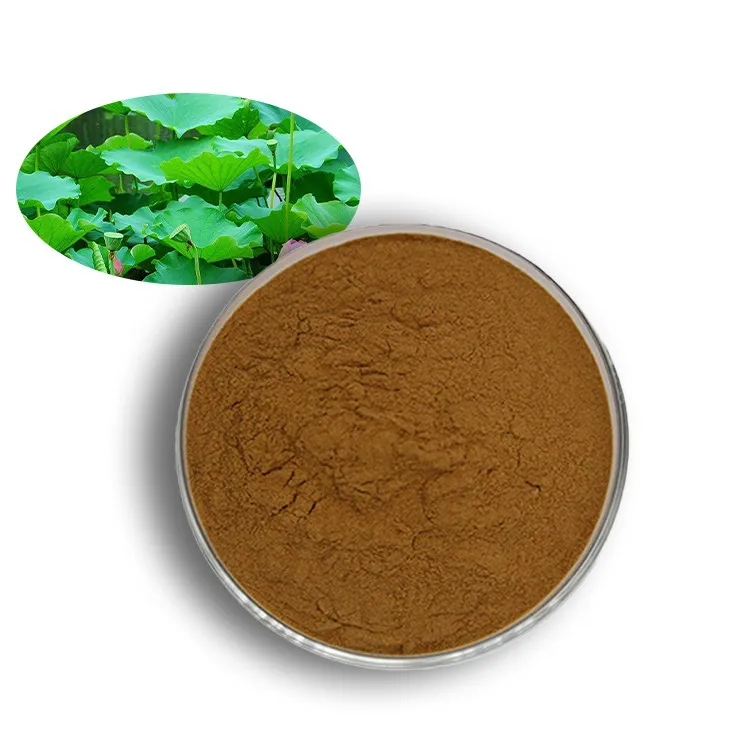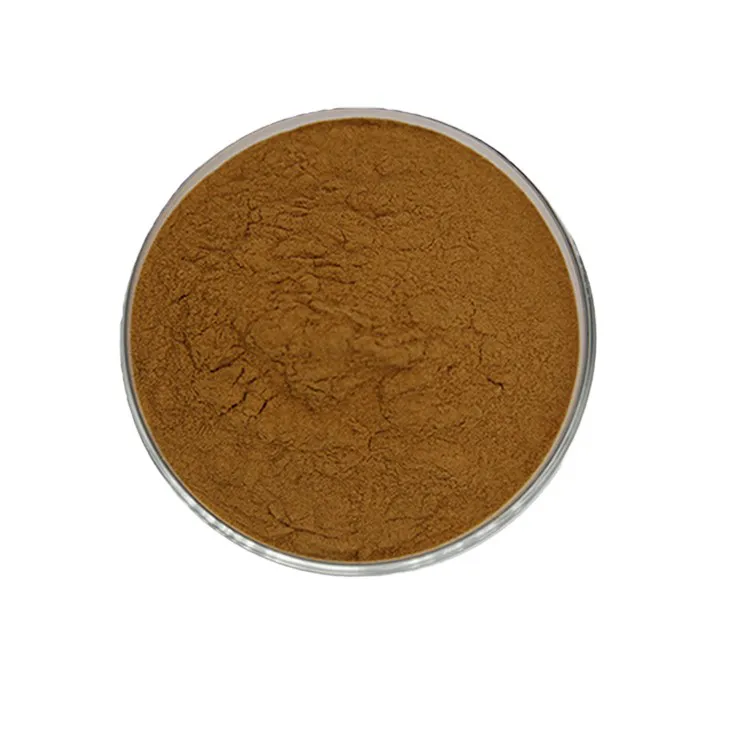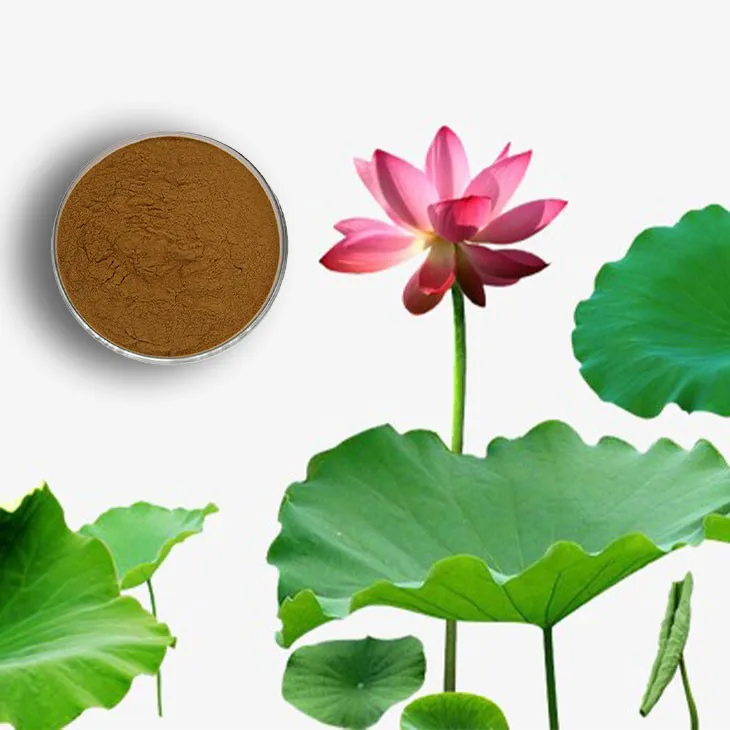- 0086-571-85302990
- sales@greenskybio.com
The best lotus leaf extract in nature.
2024-11-29

Introduction to Lotus leaf extract
Lotus leaf extract is a remarkable natural substance that has been garnering increasing attention in recent years. Derived from the leaves of the lotus plant, which is not only a symbol of purity and beauty in many cultures but also a storehouse of beneficial compounds. The lotus plant has long been used in traditional medicine systems, and modern science is now beginning to unlock the full potential of its leaf extract.

Nutritional Powerhouse
Lotus leaf extract is indeed a nutritional powerhouse. It contains a variety of bioactive compounds such as flavonoids, alkaloids, and phenolic acids. These components contribute to its many potential health benefits.
- Flavonoids in the extract are known for their antioxidant properties. They can scavenge free radicals in the body, which are unstable molecules that can cause damage to cells and contribute to various diseases such as cancer and heart disease. By neutralizing these free radicals, the flavonoids in lotus leaf extract may help protect the body's cells and tissues from oxidative stress.
- Alkaloids present in the extract may have physiological effects on the body. They could potentially interact with various receptors and enzymes in the body, although more research is needed to fully understand their mechanisms of action.
- Phenolic acids also play a role in the overall health - promoting properties of lotus leaf extract. They may contribute to its anti - inflammatory effects, which are important for maintaining a healthy immune system and reducing the risk of chronic inflammatory diseases.

Role in Blood Sugar Regulation
One of the most promising aspects of lotus leaf extract is its potential role in regulating blood sugar levels. Diabetes has become a global epidemic, and finding natural ways to manage blood sugar is of great importance.
- Studies have suggested that certain compounds in lotus leaf extract may improve insulin sensitivity. Insulin is a hormone that regulates blood sugar by allowing cells to take up glucose from the bloodstream. When insulin sensitivity is improved, cells are more responsive to insulin, and this can lead to better blood sugar control.
- Additionally, lotus leaf extract may also affect the digestion and absorption of carbohydrates. By slowing down the breakdown and absorption of carbohydrates in the gut, it can prevent rapid spikes in blood sugar levels after a meal. This is particularly beneficial for individuals with diabetes or those at risk of developing the condition.

Antimicrobial Qualities
The antimicrobial qualities of lotus leaf extract are another area of great interest. In the field of food preservation, these qualities can be highly valuable.
- It has been shown to have inhibitory effects on various microorganisms, including bacteria and fungi. For example, it may prevent the growth of spoilage - causing bacteria in food, thereby extending the shelf life of perishable products.
- In the context of human health, its antimicrobial properties could potentially be used to combat infections. However, more research is needed to develop it into a viable therapeutic agent against microbial infections.

Enhancing Detoxification
The ability of lotus leaf extract to enhance the body's detoxification process is also a significant aspect of its potential health benefits.
- It may support the liver, which is the body's main detoxifying organ. The liver is responsible for filtering toxins from the blood and metabolizing drugs and other substances. Lotus leaf extract could potentially help the liver function more efficiently by providing antioxidant protection and promoting the synthesis of enzymes involved in detoxification.
- Moreover, it may also play a role in enhancing the elimination of toxins through the kidneys and intestines. By improving the function of these excretory organs, the body can more effectively rid itself of harmful substances.
Methods of Extraction
There are several methods for extracting the beneficial compounds from lotus leaves.
- Solvent extraction is a commonly used method. Different solvents such as ethanol or water can be used to extract the active ingredients from the lotus leaves. Ethanol extraction is often preferred as it can extract a wide range of compounds, including those with lipophilic (fat - loving) properties.
- Supercritical fluid extraction is another advanced method. In this process, supercritical carbon dioxide is used as the solvent. This method has the advantage of being more environmentally friendly and can produce a purer extract with higher yields of certain bioactive compounds.
- Microwave - assisted extraction is also being explored. This method uses microwave energy to accelerate the extraction process. It can reduce the extraction time and potentially improve the quality of the extract.
Safety and Precautions
While lotus leaf extract has many potential health benefits, it is important to consider safety and precautions.
- As with any supplement, it is crucial to ensure that it is sourced from a reliable and reputable manufacturer. Poor - quality extracts may contain contaminants or may not have the correct potency.
- Some individuals may be allergic to lotus leaf extract. Allergic reactions can range from mild skin rashes to more severe symptoms such as difficulty breathing. If any signs of an allergic reaction occur after taking lotus leaf extract, it should be discontinued immediately and medical attention sought.
- Pregnant and breastfeeding women should exercise caution when considering taking lotus leaf extract. There is currently limited research on its safety during pregnancy and lactation, so it is advisable to consult a healthcare provider before use.
Conclusion
In conclusion, lotus leaf extract is a natural substance with a wide range of potential health benefits. Its role in blood sugar regulation, antimicrobial activity, and enhancing the body's detoxification process makes it a very interesting area of study. However, more research is needed to fully understand its mechanisms of action and to develop it into effective therapeutic products. With proper safety precautions and further research, lotus leaf extract has the potential to become an important part of natural health remedies in the future.
FAQ:
What are the main benefits of lotus leaf extract?
Lotus leaf extract has several main benefits. It may play a role in regulating blood sugar levels, which is potentially beneficial for diabetes management. It also has antimicrobial qualities, useful for food preservation, and can enhance the body's detoxification process, promoting overall well - being.
How does lotus leaf extract help in diabetes management?
Research has suggested that lotus leaf extract may have a role in regulating blood sugar levels. However, the exact mechanisms are still being studied. It is thought that certain compounds in the extract might interact with the body's metabolic processes related to glucose regulation.
What makes lotus leaf extract effective in food preservation?
The antimicrobial qualities of lotus leaf extract are what make it effective in food preservation. These antimicrobial properties can inhibit the growth of microorganisms that cause food spoilage, thus extending the shelf life of food products.
How does lotus leaf extract enhance the body's detoxification process?
The extract may contain certain compounds that support the body's natural detoxification mechanisms. It could potentially interact with the liver and kidneys, which are key organs in the detoxification process, helping them to function more efficiently in eliminating toxins from the body.
Is lotus leaf extract safe for consumption?
Generally, when used appropriately, lotus leaf extract is considered safe for consumption. However, as with any supplement, it is important to follow recommended dosages. Some people may experience mild side effects, but serious adverse reactions are rare. It is also advisable to consult a healthcare provider before starting to use lotus leaf extract, especially for those with pre - existing medical conditions or those taking other medications.
Related literature
- The Potential Health Benefits of Lotus Leaf Extract"
- "Lotus Leaf Extract: A Natural Antimicrobial Agent in Food Preservation"
- "Regulation of Blood Sugar by Lotus Leaf Extract: Current Research Findings"
- ▶ Hesperidin
- ▶ citrus bioflavonoids
- ▶ plant extract
- ▶ lycopene
- ▶ Diosmin
- ▶ Grape seed extract
- ▶ Sea buckthorn Juice Powder
- ▶ Beetroot powder
- ▶ Hops Extract
- ▶ Artichoke Extract
- ▶ Reishi mushroom extract
- ▶ Astaxanthin
- ▶ Green Tea Extract
- ▶ Curcumin Extract
- ▶ Horse Chestnut Extract
- ▶ Other Problems
- ▶ Boswellia Serrata Extract
- ▶ Resveratrol Extract
- ▶ Marigold Extract
- ▶ Grape Leaf Extract
- ▶ blog3
- ▶ blog4
-
High - quality kidney bean extract products.
2024-11-29
-
The best aged garlic extract on the market.
2024-11-29
-
How to make powder with L - arginine.
2024-11-29
-
Certified organic hawthorn extract.
2024-11-29
-
Bulk purchase of mulberry leaf extract.
2024-11-29
-
Wholesale Suppliers of Eyebright Extract.
2024-11-29
-
Fenugreek Extract Powder
2024-11-29
-
Shikone Extract
2024-11-29
-
Red Date Extract
2024-11-29
-
Artichoke Extract
2024-11-29
-
Rose Hip Extract
2024-11-29
-
Kelp Extract Powder
2024-11-29
-
Nutmeg Extract
2024-11-29
-
Sophora Japonica Flower Extract
2024-11-29
-
Baicalin
2024-11-29
-
Pueraria Lobata Extract
2024-11-29





















